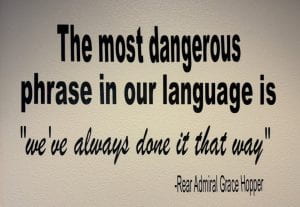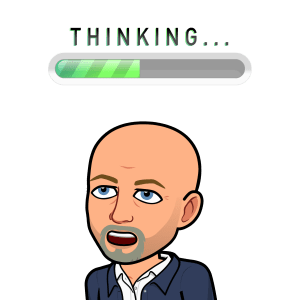 Change is a constant in the world of education. I know, it probably doesn’t feel that way and if you look in some classrooms you’d find an argument against that statement. Yet school leaders often find themselves at the forefront of initiatives aimed at improving teaching and learning. However, resistance to change is a common challenge that can hinder progress and innovation.
Change is a constant in the world of education. I know, it probably doesn’t feel that way and if you look in some classrooms you’d find an argument against that statement. Yet school leaders often find themselves at the forefront of initiatives aimed at improving teaching and learning. However, resistance to change is a common challenge that can hinder progress and innovation.
In this blog post, I’ll share five valuable tips for school leaders facing resistance to change, providing insights on how to navigate these obstacles and foster a culture of adaptability within their institutions.
 Communication is Key: One of the primary reasons for resistance to change is a lack of understanding or misinformation. School leaders must prioritize clear and transparent communication to address concerns and share the rationale behind the proposed changes. Holding regular town hall meetings, sending out newsletters, and utilizing digital platforms can help disseminate information effectively. By fostering an open dialogue, leaders create an environment where stakeholders feel heard and are more likely to embrace the change. Speak the change into life as often and in as many settings as possible.
Communication is Key: One of the primary reasons for resistance to change is a lack of understanding or misinformation. School leaders must prioritize clear and transparent communication to address concerns and share the rationale behind the proposed changes. Holding regular town hall meetings, sending out newsletters, and utilizing digital platforms can help disseminate information effectively. By fostering an open dialogue, leaders create an environment where stakeholders feel heard and are more likely to embrace the change. Speak the change into life as often and in as many settings as possible.
 Inclusive Decision-Making: Resistance often stems from a feeling of exclusion from the decision-making process. School leaders can mitigate this by involving as many stakeholders in the planning and implementation stages of change initiatives. Collaborative decision-making not only provides diverse perspectives but also fosters a sense of ownership among teachers, students, and parents. When individuals feel that their input is valued, they are more likely to support and actively participate in the change process. Be clear here, however, that being heard and providing input do not always equate to getting one’s way.
Inclusive Decision-Making: Resistance often stems from a feeling of exclusion from the decision-making process. School leaders can mitigate this by involving as many stakeholders in the planning and implementation stages of change initiatives. Collaborative decision-making not only provides diverse perspectives but also fosters a sense of ownership among teachers, students, and parents. When individuals feel that their input is valued, they are more likely to support and actively participate in the change process. Be clear here, however, that being heard and providing input do not always equate to getting one’s way.
 Professional Development Opportunities: Resistance to change may also arise from a lack of confidence or unfamiliarity with new methodologies or technologies. School leaders should invest in professional development opportunities to equip staff with the necessary skills and knowledge to embrace change. Workshops, training sessions, and mentorship programs can empower educators to feel more confident in their ability to adapt to new teaching methods, curriculum changes, or technological advancements. Additionally, use pd to create common vocabulary and vernacular. This will help eliminate resistance hidden in the phrase, ‘oh I already do that, I just call it something else’.
Professional Development Opportunities: Resistance to change may also arise from a lack of confidence or unfamiliarity with new methodologies or technologies. School leaders should invest in professional development opportunities to equip staff with the necessary skills and knowledge to embrace change. Workshops, training sessions, and mentorship programs can empower educators to feel more confident in their ability to adapt to new teaching methods, curriculum changes, or technological advancements. Additionally, use pd to create common vocabulary and vernacular. This will help eliminate resistance hidden in the phrase, ‘oh I already do that, I just call it something else’.
 Celebrate Small Wins: Structural, pegogical, or changes to schedules can be overwhelming, and resistance may intensify if individuals feel that the goals driving the change are unattainable. School leaders should break down the change process into smaller, manageable steps and celebrate achievements along the way. Recognizing and acknowledging the efforts of teachers and students helps build momentum and reinforces the positive aspects of the change. Small wins contribute to a sense of progress, fostering a more positive attitude toward the overall transformation.
Celebrate Small Wins: Structural, pegogical, or changes to schedules can be overwhelming, and resistance may intensify if individuals feel that the goals driving the change are unattainable. School leaders should break down the change process into smaller, manageable steps and celebrate achievements along the way. Recognizing and acknowledging the efforts of teachers and students helps build momentum and reinforces the positive aspects of the change. Small wins contribute to a sense of progress, fostering a more positive attitude toward the overall transformation.
 Provide Ongoing Support: Change is a continuous process, and school leaders must recognize that ongoing support is crucial for sustained success. Lean into those who seem to need the most support. Establishing support systems, such as mentorship programs, peer collaboration, and regular check-ins, can help address challenges and provide individuals with the assistance they need. By demonstrating a commitment to supporting the well-being and success of all stakeholders, school leaders create an environment where change is seen as a shared journey rather than an imposed mandate.
Provide Ongoing Support: Change is a continuous process, and school leaders must recognize that ongoing support is crucial for sustained success. Lean into those who seem to need the most support. Establishing support systems, such as mentorship programs, peer collaboration, and regular check-ins, can help address challenges and provide individuals with the assistance they need. By demonstrating a commitment to supporting the well-being and success of all stakeholders, school leaders create an environment where change is seen as a shared journey rather than an imposed mandate.
 Navigating resistance to change requires a strategic and empathetic approach from school leaders. By prioritizing clear communication, inclusive decision-making, professional development, celebrating small wins, and providing ongoing support, leaders can create a positive and adaptive culture within their institutions. Embracing change is not just about overcoming resistance; it’s about fostering a continuous learning environment that benefits educators, students, and the entire school community. If your vision is strong, shared well, and people have an opportunity to have ownership of that vision, you’re well on your way to the next chapter of your school’s story.
Navigating resistance to change requires a strategic and empathetic approach from school leaders. By prioritizing clear communication, inclusive decision-making, professional development, celebrating small wins, and providing ongoing support, leaders can create a positive and adaptive culture within their institutions. Embracing change is not just about overcoming resistance; it’s about fostering a continuous learning environment that benefits educators, students, and the entire school community. If your vision is strong, shared well, and people have an opportunity to have ownership of that vision, you’re well on your way to the next chapter of your school’s story.
Have a #RoadToAwesome week
Darrin
A special release of the Leaning into Leadership podcast from Wednesday of this week had Dominic Armano and Todd Bloomer joining me for the first episode in a new, ongoing series where we answer your pressing educational leadership questions. Get it on YouTube right here.
 Tune in this Sunday to “Leaning into Leadership” where Mosongo Moukwa is my guest.
Tune in this Sunday to “Leaning into Leadership” where Mosongo Moukwa is my guest.
Need some help? Got a question? Reach out, let’s talk.
Learn more and sign up for our weekly newsletter, loaded with awesome content at roadtoawesome.net
Make sure you subscribe (button on the left) so you don’t miss any future posts.
Looking for that awesome speaker with an incredible message to build your staff culture? Look no further – connect with me here

Be First to Comment